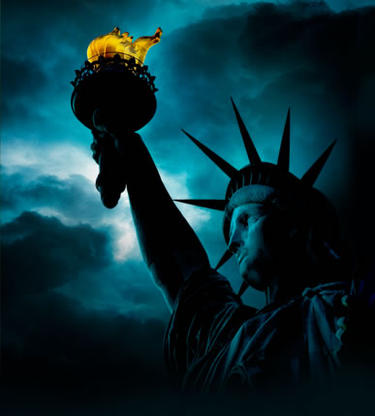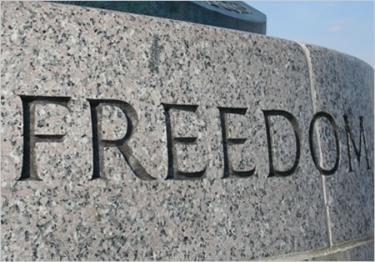As the American president takes his oath of office with his hand on the Bible, proclaiming to faithfully fulfill his responsibilities "so help me God," should we not take into consideration how God views the "state of the union" of the United States?

Source: Photo illustration by Shaun Venish/123RF/iStockphoto
Warning signs come in many forms. Sometimes it's the piercing shriek of a fire alarm or the Emergency Alert System on the TV or radio. Maybe it's the wail of a loudspeaker indicating an oncoming tornado or hurricane. At times it might be the flashing lights and siren of an ambulance, fire truck or other emergency vehicle.
Regardless of their form, we're usually aware of what warning signs mean. They're intended to alert us to approaching danger, and we know that we must take action if we are to remain safe.
Sometimes the warning signs are not so obvious. Rather than screaming in our ears or shouting in our faces to get our attention like the examples above, the signs can be much more subtle. And if we're distracted by other things and not paying attention, we can easily miss them.
Could individuals—and sometimes even great nations—remain blind to dangers that otherwise should be obvious? Could Americans be ignoring warning signs that are shouting for our attention?
A look at the state of the union
Early each year the U.S. president gives his annual State of the Union address to Congress—and, by extension, the nation and world as a whole. It's typically a lofty speech filled with ideals and platitudes expressing the president's agenda.
But despite what it's called, the speech seldom addresses the actual state of the nation. If we were to examine the condition of the United States from the perspective of God's Word, what would we find?
On the rostrum above the head of the president as He gives this speech, seemingly avoided by TV cameras, is the motto "In God We Trust." The president is himself sworn into office with his hand on a Bible as he pledges to carry out his duties "so help me God."
So what would God think about the current state of the United States?
Growing acceptance of immoral behavior
The November 2012 U.S. elections were a revealing window into the prevailing mindset of voters. For the first time, voters legalized marriage between homosexuals in several states—Maine, Maryland and Washington.
Same-sex marriage had already been approved by state legislatures or courts in six other states, but this was the first time it was approved directly by voters—after it had previously been rejected 32 times in statewide votes dating back to 1998.
Homosexual behavior is repeatedly condemned in Scripture (
Leviticus 18:22;
Leviticus 20:13;
Romans 1:26-27;
1 Corinthians 6:9-10;
1 Timothy 1:10). Yet far from being ashamed of such behavior, many pride themselves on their acceptance of it.
With the country's many "gay pride" marches and parades, could
Isaiah 3:9 be a prophecy for America today? "The look on their faces testifies against them;
they parade their sin like Sodom; they do not hide it. Woe to them! They have brought disaster upon themselves" (New International Version, emphasis added throughout).
Meanwhile, in two states—Colorado and Washington—voters approved possession and recreational use of marijuana, a hallucinogenic drug that remains illegal under federal law. Nineteen other states allow what is called "medicinal" use of the drug, though it's clearly abused by many who want to use it simply to get high.
Although marijuana isn't directly mentioned in Scripture, God's Word clearly condemns intoxication in any form—calling those seeking it "drunkards" who will have no place in the Kingdom of God (
1 Corinthians 5:11;
1 Corinthians 6:10;
Galatians 5:21). The reason so many use marijuana is for the intoxicated state it produces. Otherwise, why do it?
Any nation brings curses on itself when it turns its back on biblical values and accepts sin as normal and commonplace. Thinking themselves enlightened, people in reality only show how shortsighted and blind they are to the consequences of their choices.
They fail to take into account God's view, which He states in
Isaiah 5:20-25: "Woe to those who call evil good, and good evil; who put darkness for light, and light for darkness; who put bitter for sweet, and sweet for bitter! Woe to those who are wise in their own eyes, and prudent in their own sight! . . .
"Therefore, as the fire devours the stubble, and the flame consumes the chaff, so their root will be as rottenness, and their blossom will ascend like dust; because they have rejected the law of the Lord of hosts, and despised the word of the Holy One of Israel. Therefore the anger of the Lord is aroused against His people; He has stretched out His hand against them and stricken them . . ."
Broken marriages + broken families = broken society
As we have often discussed in the pages of
The Good News, marriage and family are the building blocks of society. When marriages and families break down, so do the bonds holding society together.
So what's the state of marriage and family in America today?
For years about half of all U.S. marriages have ended in divorce. Seeing this sad fact, growing numbers of couples choose to skip marriage altogether.
According to U.S. census figures, between 1960 and 2000 the number of unmarried couples living together
increased tenfold. It
doubled again from 2000 to 2010, to 7.5 million couples—though the actual number may be considerably higher since unmarried partners may describe themselves as just friends or roommates.
About 12 percent of U.S. households are now unmarried couples living together. In some cities a third of couples living together are not married to each other. Other recent studies have shown that
almost 60 percent of women ages 19-44 have chosen to live with a partner of the opposite sex at some point in their lives.
However, rather than a formula for stability, living together before marriage only increases the odds that a couple will break up. About 40 percent of couples who move in together separate before marriage. And, of those who do marry, studies show the divorce rate ranges from
50 to 80 percent higher than those who chose not to live together before marriage.
The curses of promiscuity, abortion and illegitimacy
Sexual promiscuity begins early. Studies show that from 40 to 50 percent of U.S. teens are sexually active, with 20 percent having sexual intercourse
by age 15.
And they are reaping the tragic fruits of breaking God's command against engaging in sex outside of marriage (
Exodus 20:14;
Ephesians 5:3, 5;
Hebrews 13:4;
Revelation 21:8). Young people ages 15-24 account for
nearly half of the nation's 19 million new sexually transmitted infections each year. One in four females ages 15 to 19 is infected with at least one sexually transmitted disease. And each year more than 750,000 15- to 19-year-old females become pregnant, the vast majority unintended.
With so many showing such disregard for God's instruction regarding sex and marriage, it's no surprise that the nation is suffering from twin curses of abortion and illegitimacy. According to the U.S. Centers for Disease Control and Prevention (CDC), almost one in five pregnancies (18 percent) in America end in the abortion of the unborn baby. The nation's estimated annual death toll from abortion ranges from about 750,000 to over 1 million.
To put this in perspective, Americans were rightfully horrified by the terrorist attacks on Sept. 11, 2001, in which nearly 3,000 people lost their lives in the World Trade Center, the Pentagon and in the crash of an airliner in a Pennsylvania field. Yet
almost the same number of innocent unborn children are murdered by abortion in America every single day. Where is the outrage? What does this tell us about the deplorable moral state of the nation?
Another sad fruit of the nation's promiscuity is that the percentage of births that are illegitimate—children born to unmarried parents—is also dramatically rising.
Of first births to mothers ages 15 to 44 today,
almost half—46 percent— are illegitimate. For women ages 20-24, well over half—a staggering
61 percent —are to unmarried mothers.
A huge financial toll on society
As bad as these percentages are, they only hint at the terrible toll this takes on society—and on these children in particular. Numerous studies have shown that children born into fatherless homes are far more likely to die in infancy, to be poor, to show aggressive behavior, to abuse drugs, to have behavioral problems in school and to spend time in jail or prison.
Nearly 2 million children are born each year to unmarried parents, often to women with limited education and prospects for improving their lives. What is the cost to taxpayers?
In the 2011 fiscal year, federal and state governments spent a combined
$450 billion on assistance to low-income families with children—with about three quarters of this, or some $330 billion, going to single-parent families. This averages out to
about $30,000 in assistance to each single-parent household.
But this doesn't mean that this much is actually going to those who need it. Vast amounts go to the government bureaucracies and hundreds of thousands of federal and state employees tasked with overseeing assistance programs. The U.S. government currently operates
more than 80 different means-tested federal programs that provide social services, medical care, food, housing, cash and other assistance to low-income families and individuals.
The curse of skyrocketing debt
It should be no surprise that the nation's growing social ills have contributed to an explosion in its financial problems.
Over the last year the debt problems of the European "PIIGS" countries—Portugal, Italy, Ireland, Greece and Spain—have regularly made headlines. Each of the five have enormous debt problems due to their inability to rein in government spending.
However, the per-person share of the government's outstanding debt in the United States is actually higher than in any of these deeply troubled countries!
Each American's share of federal government debt is about $45,000—15 percent higher than the per-capita debt of Greeks at almost $39,000. Even worse, American per-capita debt is expected to grow to
almost $75,000 by 2020, only seven years away.
Why is government debt exploding? The simple answer is that
the government is borrowing 40 cents of every dollar it spends.
To put this in perspective, the U.S. government is like a family with a $21,700 annual income spending $38,200 a year, with $16,500 of that put on credit cards—when the family already owes $142,710 on those credit cards!
For four consecutive years the federal government has amassed a trillion-dollar deficit. It took the United States 200 years to accumulate its first trillion dollars in debt. Now it takes about 10 months!
In September 2012 the total deficit passed $16 trillion—
an amount exceeding the nation's entire GDP! How vast is that number? A stack of 16 trillion $1 bills would extend higher than Mt. Everest, past the space station, past the moon 239,000 miles away and back to Earth—
twice.
Shocking as these figures are, they in fact vastly
underestimate the scope of the problem. We need to factor in unfunded liabilities—the amount needed to fully fund government promises for Social Security, Medicare, military and government employee pensions and health care. The real debt load then jumps, depending on which set of economic and demographic assumptions one works from, to five to ten times the $16 trillion amount—
far exceeding the GDP of the entire planet! And that doesn't even include similar unfunded liabilities for the 50 individual states and hundreds of American towns and cities.
The bottom line? America's cities are broke, its states are broke, and the nation is broke. And we're living in a fool's paradise.
God warned centuries ago that "the borrower is servant to the lender" (
Proverbs 22:7). America currently spends more than
$400 billion per year just to pay interest on its staggering debt!
God pronounced curses that would come from a nation disobeying Him and rejecting His instruction: "The alien who is among you shall rise higher and higher above you, and you shall come down lower and lower. He shall lend to you, but you shall not lend to him; he shall be the head, and you shall be the tail" (
Deuteronomy 28:43-44).
The United States is experiencing a drastic turnaround unparalleled in history. Until about a generation ago, the United States was the world's leading lender nation. But now that has completely reversed, and America is the most indebted nation in world history—with more than half of U.S. debt held by rival nations such as China, Russia, Iran and Venezuela.
From blessings to curses
The United States is under a curse—as warned of centuries ago in the pages of your Bible. Leviticus 26 and Deuteronomy 28 record the blessings God promised would come when a nation honored and obeyed Him—and the curses that would come when it dishonors and disobeys Him, such as becoming a debtor nation, as quoted above.
For its first two centuries America enjoyed the abundant blessings foretold.
Yet God had warned: "But it shall come to pass, if you do not obey the voice of the Lord your God, to observe carefully all His commandments and His statutes which I command you today, that all these curses will come upon you and overtake you" (
Deuteronomy 28:15).
What curses did He foretell?
"Cursed shall you be in the city," He began (
Deuteronomy 28:16). What is the state of America's cities? Many are impressive on the outside, but they are rotten at the core. Growing numbers are bankrupt. Many are ridden with crime. Poverty, corruption, failing schools and thousands of unassimilated immigrants eat away at their stability. Millions of people flee them—with many millions more wishing they could do the same.
"Cursed shall be your basket and your kneading bowl," God continues (
Deuteronomy 28:17). These represent our food sources. Study after study shows that many of our food sources aren't healthy or good for us. For many, our diet and lifestyle may in fact be dangerous to our health.
"Cursed shall be the fruit of your body" (
Deuteronomy 28:18). Birthrates are declining. And with the legalization of abortion, we have viewed our own children as curses and slaughtered them by the millions.
For the American children who are born, one in six has some kind of developmental disability according to the CDC—and the number is growing.
Moreover, as noted above, millions of children are born into households where the mother or father or both are ill-equipped
to care for them financially, emotionally, mentally or spiritually.
"Cursed shall be . . . the produce of your land, the increase of your cattle and the offspring of your flocks" (
Deuteronomy 28:18). Only a few years ago the United States was among the world's largest exporters of food—primarily wheat, corn and meat. Now that too is reversed, and America actually imports more food than it exports.
"The Lord will make the plague cling to you . . . [He] will strike you with consumption, with fever, with inflammation, with severe burning fever . . . they shall pursue you until you perish" (
Deuteronomy 28:21-22). In comparison to much of the world, Americans as a whole enjoy good health and long life. But that comes at an increasingly steep price. From 1980 to today,
health care expenses have exploded more than tenfold.
Health care costs are currently about $2.8 trillion, amounting to 18 percent of the nation's GDP. Yet in spite of such enormous expenditures, Americans' life expectancy ranks only 42nd in the world, well behind most advanced nations.
Drought and defeat
"The sky over your head shall be bronze, and the earth under you iron. The Lord will change the rain of your land into powder, and only dust shall come down upon you from the sky until you are destroyed" (
Deuteronomy 28:23-24, New Revised Standard Version).
Many Americans were rightfully worried about the widespread droughts and massive wildfires that plagued the country in 2012—as they did in several preceding years. With the nation having moved into winter, the situation remains serious. Lack of rainfall and snowfall has created the worst conditions for the winter wheat crop in almost 30 years.
Drought conditions have caused levels of two of the Great Lakes—Michigan and Huron—to fall to near-record lows, with the other three below historical averages. On the Mississippi River, water levels have dropped 15 to 20 feet below normal in some places, threatening to halt the barge traffic that carries millions of tons of crops and other goods through the American heartland.
"The Lord will cause you to be defeated before your enemies; you shall go out one way against them and flee seven ways before them; and you shall become troublesome to all the kingdoms of the earth," God continues (
Deuteronomy 28:25).
At the end of World War II America emerged as a new world superpower. With the collapse of the Soviet Union several decades later, it stood as the world's
lone superpower. Yet in spite of its might, in a struggle lasting eight years and costing more than 4,400 American lives and more than $1 trillion, the United States withdrew from Iraq, leaving behind a dangerous and unstable nation. A similar pattern was followed in Afghanistan, where U.S. troops are scheduled to be gone by the end of 2014.
Why is it that the most powerful military in the world was essentially fought to a draw by comparatively primitive forces—the enemies having no navy, air force or massive war machinery and fighting from caves and holes in the ground, armed with IEDs and AK-47s?
This makes no sense at all until we consider God's warning and curse for our sins:
"The Lord will cause you to be defeated before your enemies . . ."
Will we heed the warnings?
Leviticus 26 and Deuteronomy 28 also list other curses to fall on the nation that defies Him—many truly horrifying to contemplate. We don't have space to cover them all here, but you can and should read them. This is what lies ahead unless the nation changes its ways!
America likes to be viewed as a religious nation. But for many their religiosity is only skin deep. Most American households have not just one but several Bibles. The problem is that they don't
read the Bible, much less
do and live as it says.
If you don't believe these warnings from the Bible, consider these other warnings from two of the nation's greatest presidents:
Thomas Jefferson, to whom many wrongly attribute belief in complete separation of church and state, wrote:
"I tremble for my country when I reflect that God is just [and]
that his justice cannot sleep for ever . . ."
Abraham Lincoln, who saw the nation through a horrifying civil war, said: "At what point shall we expect the approach of danger? By what means shall we fortify against it? . . . I answer, if it ever reach us,
it must spring up amongst us. It cannot come from abroad. If destruction be our lot,
we must ourselves be its author and finisher."
God's justice is indeed awakening from a long sleep. The warning signs are all around. Our destruction, as Lincoln warned, is coming from ourselves as a once-great nation increasingly rots from the core.
It may be too late to turn the nation around,
but it's not too late for you. "Seek the Lord while He may be found, call upon Him while He is near," the Bible urges us. "Let the wicked forsake his way, and the unrighteous man his thoughts;
let him return to the Lord, and He will have mercy on him; and to our God, for He will abundantly pardon" (
Isaiah 55:6-7).
God's blessing, forgiveness and assurance of peace and safety await those who are willing to repent—who turn to seek Him with all of their heart.
Will you heed your Creator's plea?



